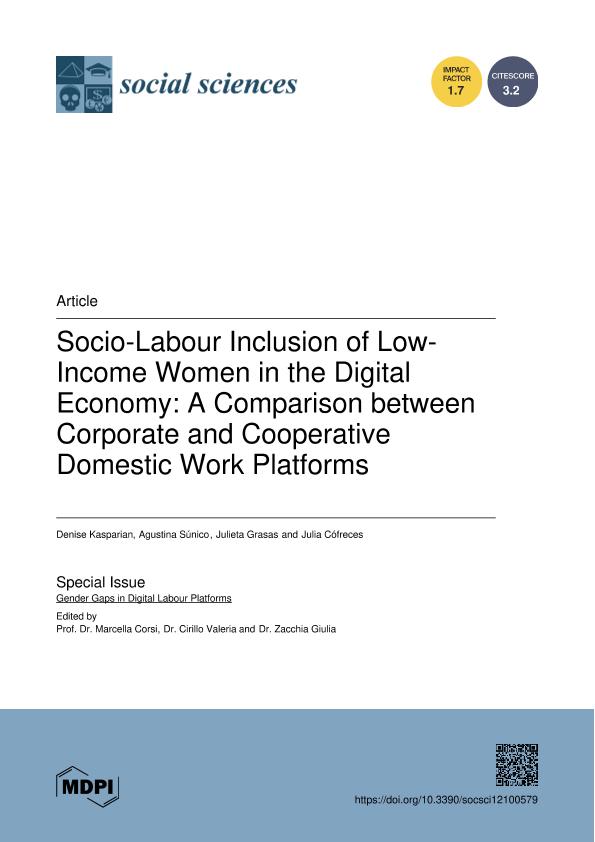Mostrar el registro sencillo del ítem
dc.contributor.author
Kasparian, Denise Romina

dc.contributor.author
Súnico, Agustina Abril

dc.contributor.author
Grasas, Maria Julieta

dc.contributor.author
Cofreces, Julia

dc.date.available
2024-03-12T15:59:48Z
dc.date.issued
2023-10
dc.identifier.citation
Kasparian, Denise Romina; Súnico, Agustina Abril; Grasas, Maria Julieta; Cofreces, Julia; Socio-Labour Inclusion of Low-Income Women in the Digital Economy: A Comparison between Corporate and Cooperative Domestic Work Platforms; Multidisciplinary Digital Publishing Institute; Social Sciences; 12; 10; 10-2023; 1-19
dc.identifier.uri
http://hdl.handle.net/11336/230248
dc.description.abstract
It is often argued that digital labour platforms entail an expansion of opportunities for women for several reasons. They facilitate the balance between paid work and household chores as a result of time flexibility, they eliminate entry and permanence barriers for typically male work sectors, they enable economic independence, and they favour the creation of professional networks. Several studies, however, have shown that the wage gap, the sexual division of labour, occupational segregation, and gender stereotypes still persist. Hence, to what extent do the new forms of labour mediated by digital platforms lead to an expansion of opportunities for women? This article analyses the socio-labour inclusion of low-income women in digital labour platforms by contrasting the model of corporate platforms against the emerging alternative of platform cooperatives. The movement of platform cooperativism advocates for the creation of platform companies based on democratic ownership and governance models that reduce inequalities in a broad sense. The methodological approach is based on the comparison of two platforms: Zolvers, which was founded in 2013 with headquarters in Argentina and which operates as an intermediary or marketplace between those who offer and those who require home cleaning services, and Up & Go, which was founded in 2017 in New York and is owned by six worker cooperatives that use the platform to offer various services on demand, particularly home cleaning services. Whereas Zolvers offers job opportunities with possibilities of formalisation but no guarantee of stability, Up & Go is owned and managed by worker cooperatives that seek to guarantee living wages for their worker-members. Concerning working conditions, Zolvers reproduces power asymmetries of domestic work, subordinating workers to the platform and the hirers. On the contrary, Up & Go empowers women workers to decide on their schedules and hirers, among other issues. Finally, whereas Zolvers does not enable the participation of workers either in governance or in technology design, the cooperative nature of Up & Go promotes their involvement.
dc.format
application/pdf
dc.language.iso
eng
dc.publisher
Multidisciplinary Digital Publishing Institute
dc.rights
info:eu-repo/semantics/openAccess
dc.rights.uri
https://creativecommons.org/licenses/by/2.5/ar/
dc.subject
DIGITAL ECONOMY
dc.subject
GENDER INEQUALITY
dc.subject
GLOBAL SOUTH
dc.subject
INTERSECTIONALITY
dc.subject
PLATFORM COOPERATIVISM
dc.subject.classification
Tópicos Sociales

dc.subject.classification
Sociología

dc.subject.classification
CIENCIAS SOCIALES

dc.title
Socio-Labour Inclusion of Low-Income Women in the Digital Economy: A Comparison between Corporate and Cooperative Domestic Work Platforms
dc.type
info:eu-repo/semantics/article
dc.type
info:ar-repo/semantics/artículo
dc.type
info:eu-repo/semantics/publishedVersion
dc.date.updated
2024-03-12T11:25:09Z
dc.identifier.eissn
2076-0760
dc.journal.volume
12
dc.journal.number
10
dc.journal.pagination
1-19
dc.journal.pais
Suiza

dc.journal.ciudad
Basilea
dc.description.fil
Fil: Kasparian, Denise Romina. Universidad de Buenos Aires. Facultad de Ciencias Sociales. Instituto de Investigaciones "Gino Germani"; Argentina. Consejo Nacional de Investigaciones Científicas y Técnicas; Argentina
dc.description.fil
Fil: Súnico, Agustina Abril. Universidad de Buenos Aires. Facultad de Ciencias Sociales. Instituto de Investigaciones "Gino Germani"; Argentina
dc.description.fil
Fil: Grasas, Maria Julieta. Universidad de Buenos Aires. Facultad de Ciencias Sociales. Instituto de Investigaciones "Gino Germani"; Argentina
dc.description.fil
Fil: Cofreces, Julia. Universidad de Buenos Aires. Facultad de Filosofía y Letras. Departamento de Filosofía; Argentina
dc.journal.title
Social Sciences
dc.relation.alternativeid
info:eu-repo/semantics/altIdentifier/doi/http://dx.doi.org/10.3390/socsci12100579
dc.relation.alternativeid
info:eu-repo/semantics/altIdentifier/url/https://www.mdpi.com/2076-0760/12/10/579
Archivos asociados
